It would be easy to wax rhapsodic over the pastoral glories of the Boston University Tanglewood Institute (BUTI), from its verdant setting in the Berkshires to the classical music that fills the air from every direction.
“Don’t write that story,” executive director Hilary Field Respass says with a smile. “Write about what we’re doing.”
Respass took the helm of the renowned summer program for musically gifted high schoolers in 2014 with a mandate to put the institute on firmer footing, both financially and organizationally. The Lenox, Mass., mansion that is BUTI’s main building and the tree-shaded paths and broad lawns look much the same as they did when the program began 51 years ago, and it continues its close connection to the Tanglewood Music Center, the summer home of the Boston Symphony Orchestra (BSO), just down the street. But behind the scenes, a lot has changed.
This year, 432 students from 35 states and 11 countries are enrolled in BUTI’s various programs, the most ever, up 36 percent from 2014. Applications also reached a new high: 1,159, up 34 percent from 2014. Individual giving has quadrupled over the past three years, Respass says, thanks in large measure to a handful of generous donors—kicked off by a $100,000 gift from investment manager Martin Messinger. And the institute is forming an advisory board of supporters, moving the $3-million-a-year budget closer to financial self-sufficiency.
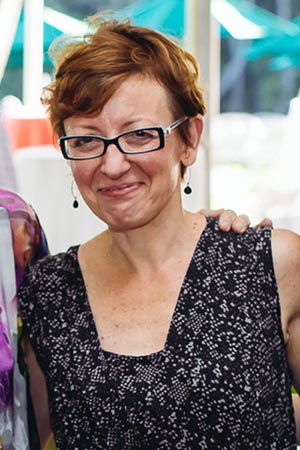
As executive director of BUTI, Hilary Field Respass is helping to put the summer program for musically gifted high schoolers on firmer financial footing. Photo by Natasha Moustache
Under Respass’ direction, BUTI has also ramped up college-prep workshops and tightened its connection with BU’s admissions office; 16 of the 49 entering freshmen in the College of Fine Arts School of Music this fall are BUTI alums. The institute recently launched a health and wellness program to address potential problems from repetitive strain injuries from hours of daily instrumental practice to adolescent emotional upheavals magnified by the gifted students’ drive for perfection.
“We’re in a period of growth. We’re growing programs, we’re enhancing curriculum, and we’re building our resources,” Respass says. “We have to build our financial strength and balance our budget. We are gathering the resources to do that as well. With all of these parts coming together, we’re very optimistic about the future.”
Hands-on teaching
As in years past, this summer’s students attend a rigorous schedule of classes and private lessons as well as master classes with BSO and visiting artists, while also rehearsing and performing in a variety of ensembles. BUTI offers 70 mostly free concerts for the community by both students and faculty, both on and off its campus. The students receive Tanglewood lawn passes for BSO concerts as well as tickets to special performances and related events.
“There’s always music happening in every corner of this place,” says Jonathan Cole (CFA’10,’12), BUTI associate director of program operations and communications.
The imposing 65-room main building was built in 1903 as a summer cottage for a prominent Boston family. The campus also includes several smaller outbuildings, and tiny wooden practice sheds dot the property, beautiful sounds coming from each.
Late on a warm Wednesday afternoon in July, about 200 people, mostly BUTI faculty and students, file into the institute’s modern-looking theater for a master class by renowned opera singer Morris Robinson (CFA’01), an Opera Institute alum. Robinson is at Tanglewood for a performance of Wagner’s Das Rheingold with the BSO later in the week. Wiping sweat from his brow with a towel, Robinson looks every bit the NCAA offensive lineman he once was, which adds an extra layer of intimidation for the seven male singers he dubs his “sacrificial lambs,” who’ll be on the hot spot, while their fellow students and faculty look on.
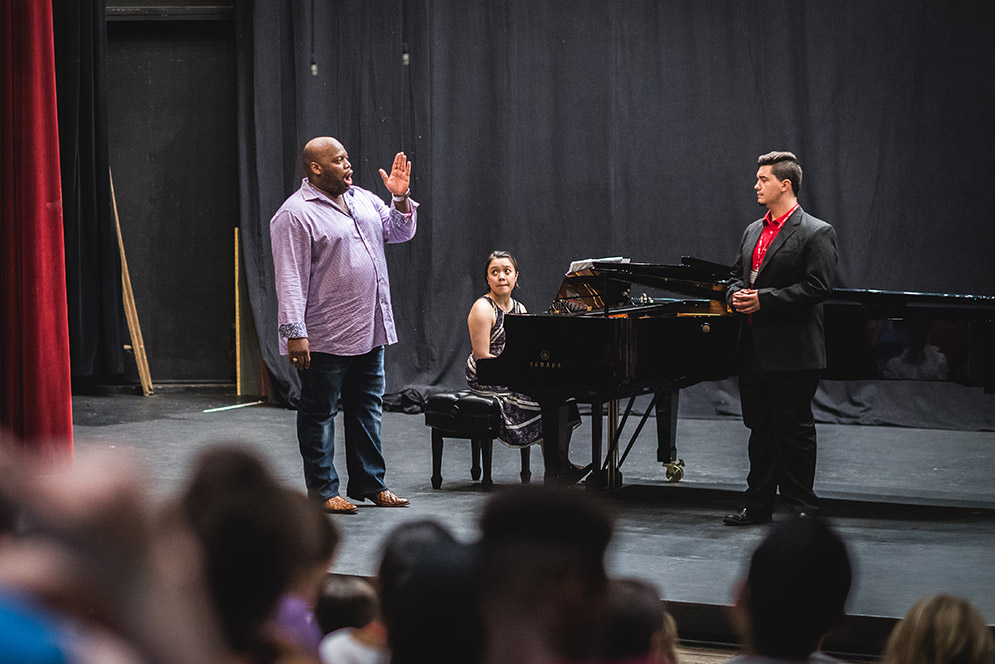
Opera singer Morris Robinson (CFA’01) critiques a vocal performance by student Nathan Schludecker during a BU Tanglewood Institute master class, as accompanist Patricia Au looks on.
“This is the gym, this is where you work out,” he tells them. “If you are going to do something wrong, do it here. And the way you correct that is to practice, practice, practice.”
One by one, the basses and baritones climb on stage, and with Patricia Au accompanying them on piano, deliver arias or art songs while Robinson listens intently from the front row, offering praise and technical critiques. “Roll those Rs,” he advises one. “Loosen your jacket, throw back your shoulders, and sing,” he tells another.
“I think you have more sound in you than you are putting out,” he tells student Jack Humphrey as he sings the aria “Vittorio, mio core,” by Giacomo Carissimi. Robinson then bounds on stage to press a hand against Humphrey’s diaphragm. “Use this,” he advises. As the student sings the number again, Robinson keeps his hand there, pushing the air out of him like a bellows.
A “life-shatteringly great” experience
Not every BUTI student becomes a full-time classical musician or singer, but many have. There are 15 BUTI alums playing in the BSO, and 20 more in the Tanglewood Music Center fellowship program for emerging professional instrumentalists and singers who have completed most of their formal studies. Many US orchestras boast at least one or two BUTI alums, such as Christopher Wilkins, music director of the Boston Landmarks Orchestra.
Respass trained as a clarinetist but has spent most of her career in arts leadership. She can tick off alums now serving in influential, nonperformer positions in the classical music world, from the new executive director of the National Symphony Orchestra to a vice chancellor at UCLA and various prominent artist managers.
“All of them identify with this summer experience as an indelible memory of not only music-making, but excellence and aspiration,” she says.
Just ask composer Nico Muhly, who was a BUTI student in the mid-1990s and is scheduled to return in August as a visiting artist for the second summer in a row.
“I can’t overstate how important BUTI was to me: for the first time, I felt that being a composer and a musician was a real, tangible thing that I could do with my life,” Muhly says. “The structure of BUTI was the best combination of rigorous and friendly, a model I’ve tried to bring to all of my musical interactions. Existing in the Tanglewood ecosystem was life-shatteringly great, and even though I come back ostensibly to teach, I find myself learning more about music and music-making every day I spend in Lenox.”
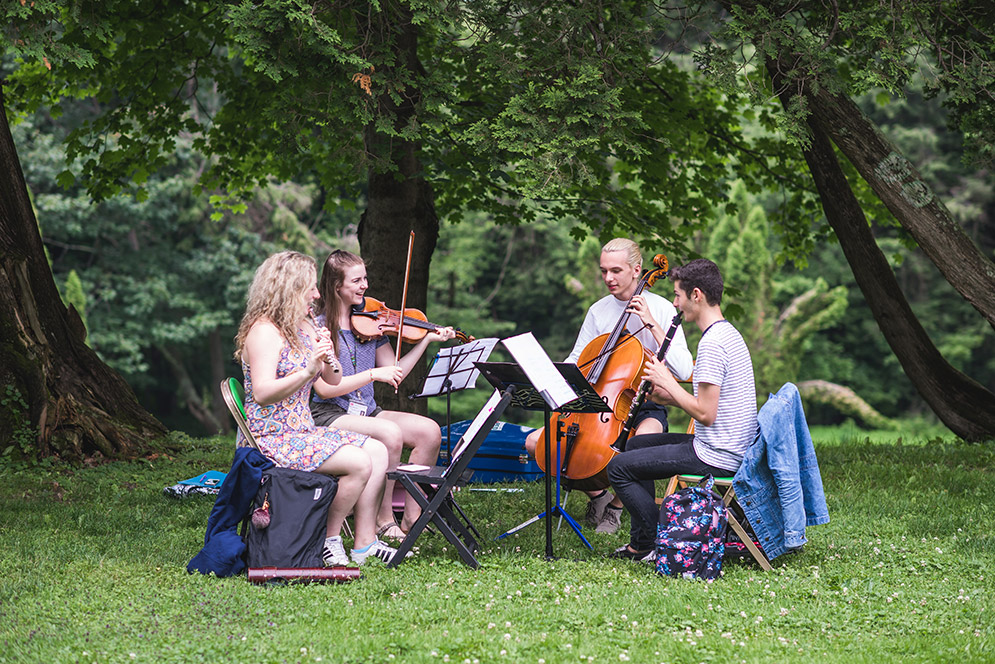
An open-air rehearsal is one of the day’s highlights for this student quartet: Stella Brooks, flute; Daniel Solowey, clarinet; Alison Mills, violin; and Hagen Bell, cello.
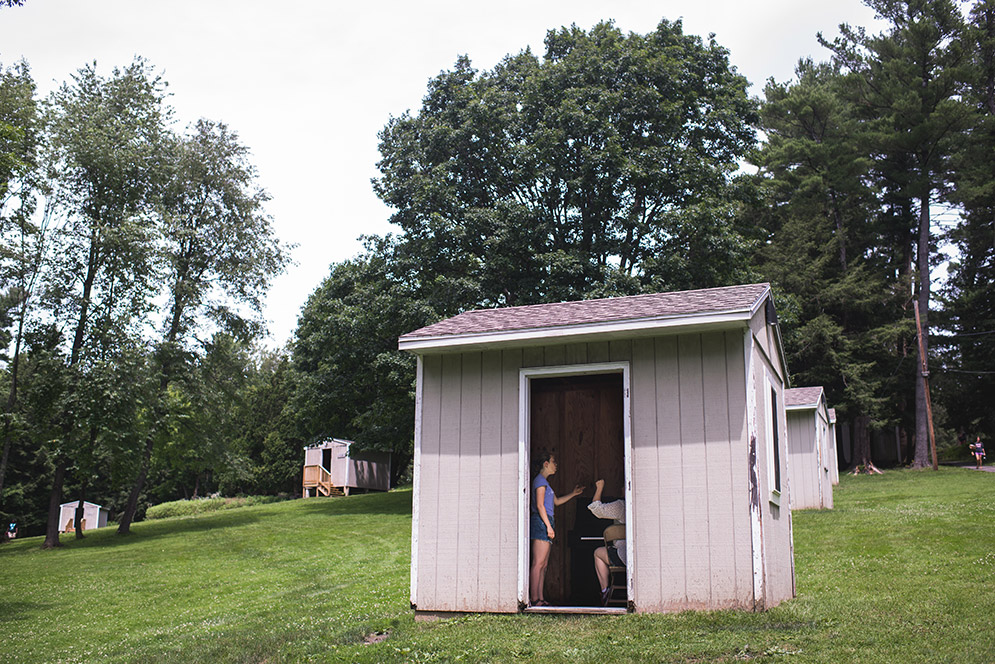
Students rehearse in tiny, simply built practice sheds that dot the lawns and groves of the BUTI campus.
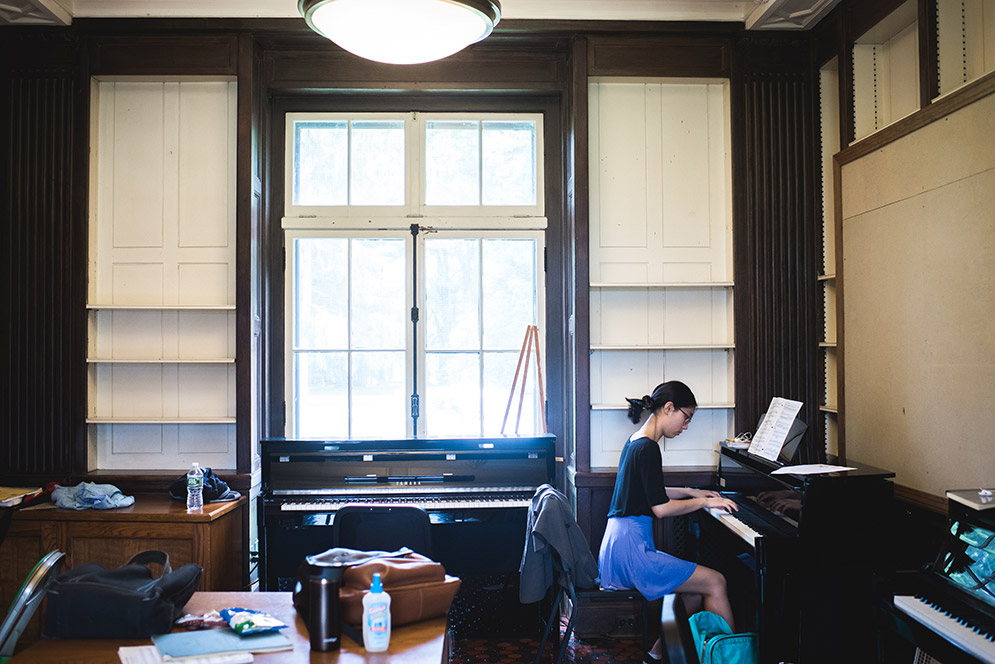
Student Mia Cheung practices in BUTI’s piano room.
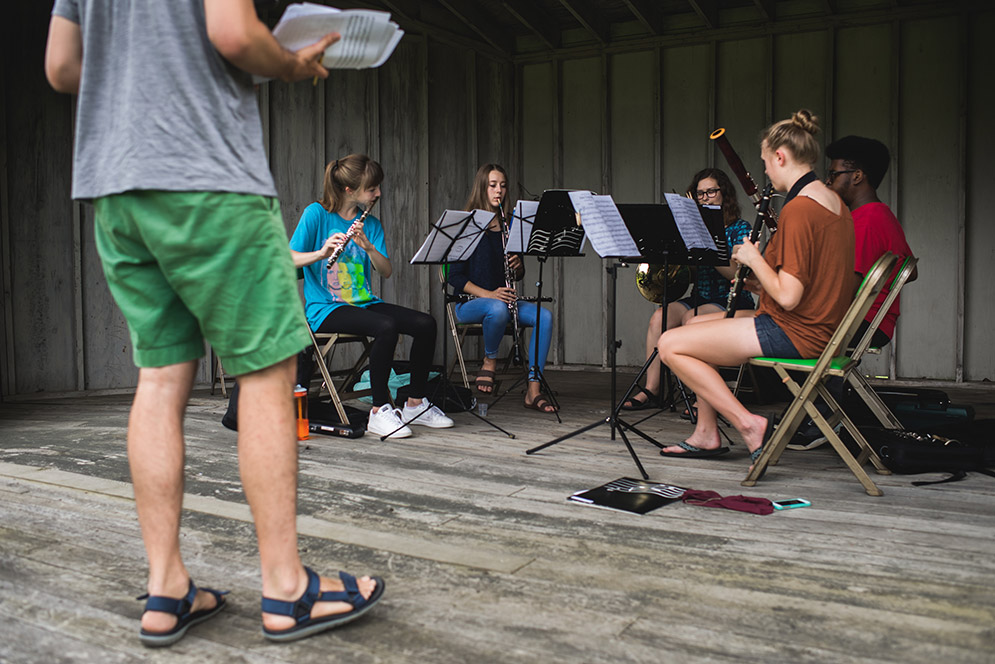
Bassoonist Sam Childers, a member of the quartet Vento Chiaro, which was in residence this summer, working with a student ensemble: Maddie Hardick, flute; Madison Nurenberg, oboe; Kate Jessen, clarinet; Winfred Felton IV, bassoon; Katherine Perrine, French horn.
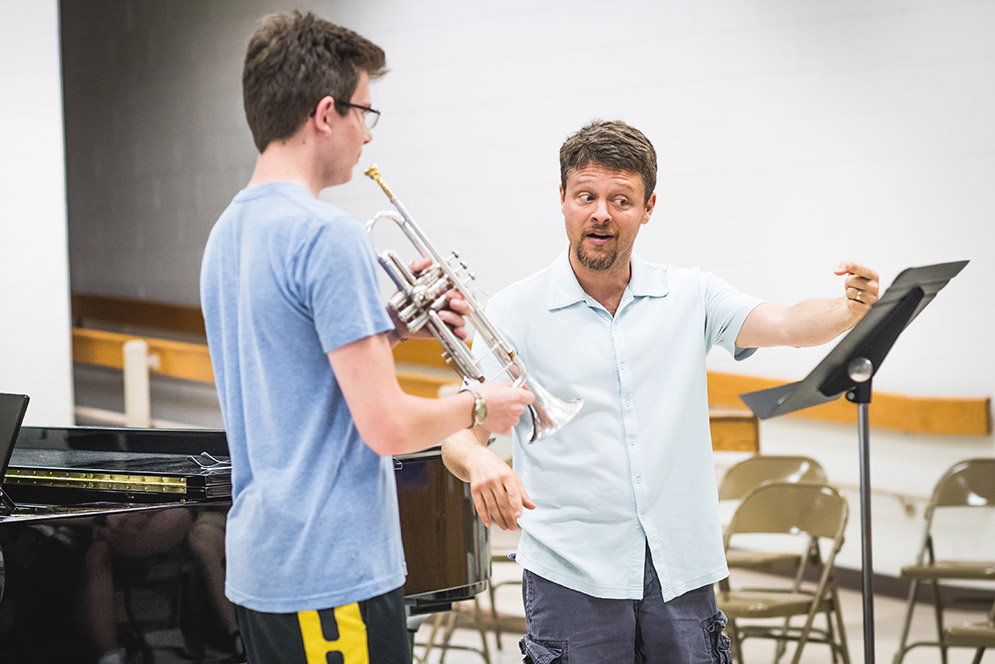
Trumpet student Jon-Michael Taylor takes advice from BSO trumpet player Ben Wright during a master class at BUTI.

Working on scores is just one of the many tasks students in the BU Tanglewood Institute Program perform.
In its second year, the visiting artist program also includes violist Nadia Sirota, whose podcast “Meet the Composer” recently won a Peabody Award, and acclaimed cellist Lynn Harrell. In addition, BUTI’s wind ensemble program hosted the woodwind quintet Vento Chiaro and Bala Chamber Brass quintet for summer residencies. All of that is on top of BSO performers who drop by for master classes.
The program’s faculty is made up of professional musicians from the School of Music and the BSO and alumni, who offer a mix of artistic inspiration, technical insight, and hard-won knowledge of a working musician’s life.
In a rented classroom at a Lenox elementary school just off campus, BSO trumpet player Ben Wright—one of this year’s instructors—runs a dozen students through their paces one at a time, tweaking tiny inflections, making them play passages over and over despite growing fatigue. “That’s what music camp is all about, pounding your face and recovering and then triumphing in concert,” Wright tells one. “Your chops feel like garbage, and that sounded beautiful. Welcome to the world of a trumpet player.”
Despite all that hard work, if you ask a BUTI student about missing the beach or the amusement park, they tend to bristle.
“It’s not like I’m giving up my summer to be here. Everyone here chooses to be here,” says Nyle Zafar, a tuba student from Arizona. “Everyone wants to work their hardest. There are very few places where you can do things at such a high level.”
On the morning after Robinson’s master class, more than 50 students gather in a rehearsal barn at the Tanglewood Music Center for a Young Artists Wind Ensemble practice. CFA master lecturer David Martins takes up the baton and leads them through Harrison’s Dream by Peter Graham. At a break, Zafar (CFA’21), alto-sax student Matthew Borneman (CFA’21), from Massachusetts, and Julia Klauss (CFA’21), a bassoonist from North Carolina, gather on the lawn to talk about the program. All three are headed to BU next month to study music performance, two of them double majors.
“A lot of us come from schools where we wish everyone was as focused as we are,” says Klauss. “Everybody here is so dedicated, and they all want to be the best they can be, and that’s the best part.”
“Hearing the BSO and the Pops and being able to apply what we heard the next day is really amazing,” says Borneman.
Building for the future
Only $2 million of BUTI’s annual budget is now covered by tuition, so Respass continues to look for ways to increase enrollment. This year, the institute added a two-week pilot program for string students aged 10 to 13 that will likely expand next year, and it introduced an electroacoustic composition program. Efforts are also under way to raise its national profile. BUTI was recently invited to participate in the Take a Stand progressive music education conference hosted by the Los Angeles Philharmonic.
“We are working to position ourselves not only as a top choice for summer music education, but also to be a leader in program development for training young artists,” says Respass. “We’ll continue to move ahead.”













































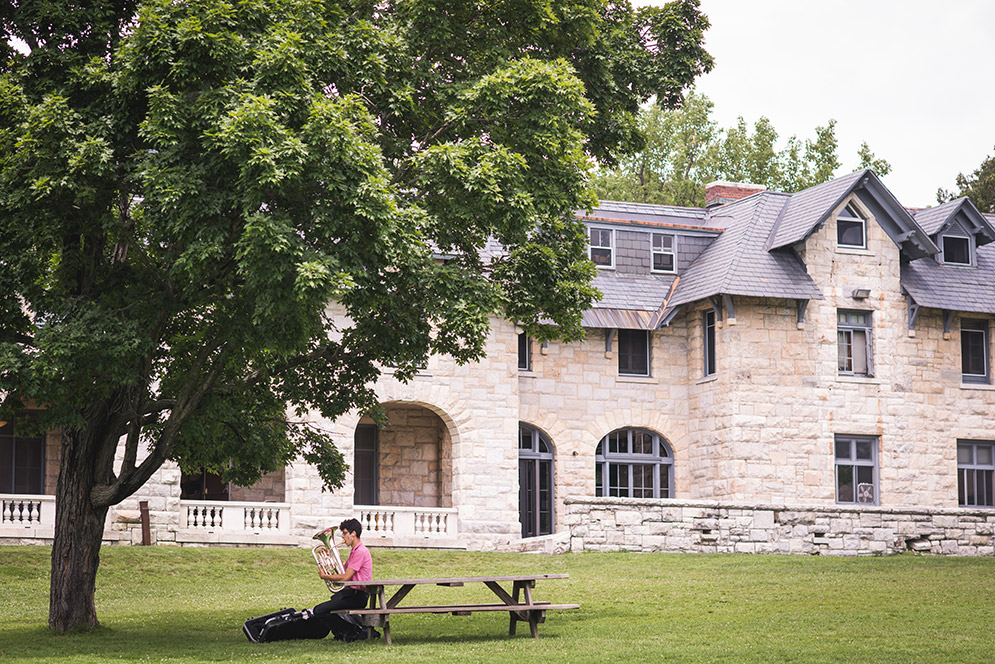








Related Stories
Advisory Panel to Weigh Future of Tanglewood Institute
CFA summer program has served high school musicians since 1967
New BU Tanglewood Institute Director Strikes Optimistic Chord
Respass seeks to boost profile, forge partnerships
A BUTI-ful 50th
Alums, dignitaries celebrate famed summer high school music program
Post Your Comment